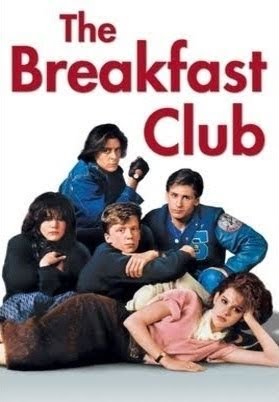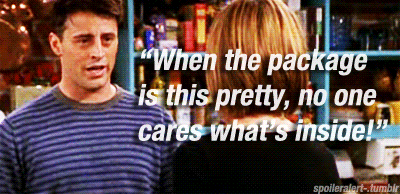 |
| It's iconic pose time! |
Okay, okay, I know it's some sort of crime to not have seen this movie but there has to be a first time, mine just happens to have been this week. Don't get up in arms about it, geez. It's a good movie. It's well written, it's well paced, it has memorable characters. I'm not the first nor will I be the last to say that I enjoyed this movie. It gets it. As a teenage movie watcher, it gets me. I like that. It's clever without constantly assailing you with cries of "Look at how clever I am!" like some other movies. Bits are clichéd but that's generally because they're making a point. That, or the clichés exist because of this movie. It comments on the human condition, the baggage we inherit from our parents, the idea of social status, barriers, prejudices. And it does it well.
Which is why I absolutely despise the second last scene of this film. Hate hate hate, haaaaaate. For those of you who haven't seen this in a while (or, like myself up until very recently, at all) here's the specific section to which I'm referring:
I had to cut little bits but, in clarification, I have a problem with the end to Allison's plot thread. A BIG problem. I mentioned in a previous post that I don't like the movie Grease. This hasn't changed. A large portion of the reason I dislike Grease is down to the deus ex makeover at the very end, which was stupid and childish and bad writing. This film's deus ex makeover is so much worse because, unlike in the case of Grease, it was a well written, thought provoking film up to that point.
It's probably obvious by now that I personally loathe makeover narratives in general. However, I have an infinitely greater problem with taking a well developed, interesting, relateable (usually female, just sayin') character and solving their problems with something as superficial and irrelevant as a makeover.
 The Breakfast Club introduces us to Allison, a social outcast, self-proclaimed pathological liar, kleptomaniac, occasionally defensive, perpetually insensitive, attention seeking, immature, surprisingly insightful, apathetic, creative, guarded, isolated, complex. Human. While watching this movie, Allison was next to Brian as the character I could most relate to and by far my favourite out of the five. Which is why it's the ultimate insult that the movie deigns it appropriate to solve her problems with a makeover and a man.
The Breakfast Club introduces us to Allison, a social outcast, self-proclaimed pathological liar, kleptomaniac, occasionally defensive, perpetually insensitive, attention seeking, immature, surprisingly insightful, apathetic, creative, guarded, isolated, complex. Human. While watching this movie, Allison was next to Brian as the character I could most relate to and by far my favourite out of the five. Which is why it's the ultimate insult that the movie deigns it appropriate to solve her problems with a makeover and a man.
THIS IS MISSING THE POINT OF THE ENTIRE MOVIE, NEVER MIND THE CHARACTER.
What is "The Breakfast Club" about? The human condition. Growing up. Society. But primarily, it's about change. Organic change. Over the course of the film, each character learns and grows and changes through the bond newly forged between them. Each comes to the realisation that everyone has problems and none can truly be classed as worse than others. Everyone has parent problems. Everyone has social pressures placed upon them. Everyone has been in dark places at some point. Everyone has vulnerabilities. Basically, everyone is human. This change of mind, shift of viewpoint is not forced. It happens gradually and no one is pressing for it to happen, it just does. And this is good. By the end of the film, each character has a greater understanding of life, the universe and everything (even Mr. Vernon). Each comes out more confident in themselves, wiser, better. There's a sort of acceptance that some problems can't be solved, that life sucks but we keep on truckin' anyway. It's a satisfying ending..... except for the romantic elements.
 |
| "I barely noticed you before but now that you're pretty..." |
If this was the intent of the film-makers (which I feel it was) then they're contradicting their own message. Instead of promoting the idea that self confidence comes from being who you are, complete with flaws and baggage, they're saying that in order for (female) social outcasts to be accepted and have self confidence, they need to be conventionally attractive (and get themselves a man).
 |
| Basically this. |
I say female because Brian (the unconventionally attractive male character) gets no makeover save for a jacket (which is never commented on) and still gets a self confidence boost. You may argue that since the movie was made in the 80's I should cut it some slack, which would be a valid point were it not for the rest of the film, which treats gender as a pretty inconsequential factor and even touches on some feminist ideas, such as the double standards regarding women and sex (the slut vs tease concept).
I feel like I should explain why this makeover trope annoys me so much on a personal level. You see, I've been this girl far too often. Not conventionally attractive. A little too smart for her own good. Resistant to social expectations. Isolated because of it. Too many times have I been in situations where the conventionally attractive people think a coating of powder is going to suddenly make me realise the error of my past behaviour, the error in challenging the status quo when all I ever had to do to fit in was to be pretty. Because they can change you. Poor naive girl, she doesn't understand that all she needs to do is dress properly, make herself up properly, speak properly, act properly, eat properly. Like the right music, have the right friends, like the right shows. Don't play video games. Don't read so much. Don't concern yourself with philosophical questions or deep rooted societal problems. Don't "cut yourself off". They think that once they change you, you'll suddenly start conforming. You'll suddenly be less strange, less difficult. And the worst part is, you start believing it. If you let them, you start feeling like you should act differently. Because they're only trying to help. Because it's easier. Because you're tired of being alone.
It all comes from this trope. Because at the end of this film, we're led to believe that Allison has done these things. We expect that she'll show up to school on Monday and be accepted. People won't recognise her, people will smile and treat her like a normal human being. All because she's stopped being so damn difficult. She's stopped creating trouble for herself.
It is for these reasons that "Wicked" continues to be one of my favourite pieces of art in the whole world, while this movie, despite all it's strengths, will always be tainted with superficiality and bad memories.
 |
| "I can change you" "Fuck that, I'ma go fight tyranny and oppression and stuff" |
Embrace the Madness
No comments:
Post a Comment